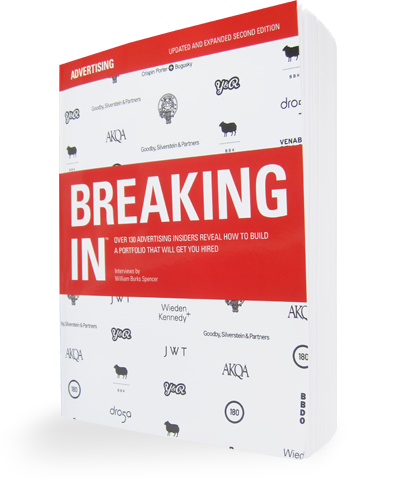If you missed it, check out some amazing work from Jeff Kling.
WS: What do you look for in a student book? And what impresses you?
JK: Well, in a student book, I look for a point of view. And I like to see an individual’s voice emerge. Separate from that of every single one of his cookie-cutter ad school peers. Because anybody can parrot, of course, all the ads that appear in all the annuals. And everybody can write in that One-Show-Penciled voice. But I like to know who I’m hiring. I like to see some evidence that, if push came to shove, and we had a big important pitch, somebody could write an ad-like object in the accepted understanding of what an ad is. But well beyond that, I want to know what specifically this person brings to the table over that person. That’s it.
I like to laugh, too. I don’t mean to say that laughter is the only emotion that I want access to from advertising or from communications. But I’ve got to respond in some way emotionally. I want a book to make me laugh or to amaze me or to make me drop my bacon sandwich. I don’t want a book merely to provoke cold verbals like, “That’s funny. That’s clever. That’s interesting.” When I feel something, I know it. And like it.
WS: So the next question that I ask most people is, do you think the work has to be finished? Or do you think sketches are okay? But now I’m remembering that your student book was just sketches, right?
JK: Yeah.
WS: Not even ads.
JK: I guess mine was sort of a unique case because it just really took the piss. So I did fake ads, ads that I quote, “Thought would be great” unquote. Or, “This is the best ad I can possibly do for this, that, or the other thing.” And they were just super naïve. I really want to know what kind of answers you’ve been getting back because I think people pay huge lip service to “the sketched-out idea.” And it’s “all about the idea.” But if you show 100 percent of creative directors in advertising the sketched-out idea on a fucking napkin they won’t even fucking look at it. They won’t do it. And they’ll probably either lie and say it’s all about the idea, or they’ll say, “Well there’s no reason why somebody nowadays shouldn’t have access to slick production and desktop publishing, etc., etc.” That’s definitely true for art directors and designers. But a writer? I mean, come on. Words can appear a lot of ways. So that’s what I’m interested in. That’s not to say a book should only be that, but I don’t mind that. I don’t mind that at all.
WS: Do you think you need long copy in the book?
JK: I don’t know. I don’t think it matters. I mean, there’s only copy that’s too long, you know? And I like to see that somebody really can write. I like to hire writers. And people who are writers first…and then, because they’re a writer, they can handle the subset called “ads.” I never, ever want to hire an ad writer, ever. So, I don’t necessarily want to see a long-copy ad because, in a student book especially, they suffer—they fall into that “ad-y” rhythm. But, if you want to put in a play you wrote, or a thing you got published in McSweeney’s online, or whatever. Something like that in there? Yeah, I really want to see that stuff.
WS: That was my next question. Do you think things that aren’t ads are good? And I think you’re going to say yes. So then my follow-up is: Do you need ads at all? What should be the balance between ads and other work?
JK: I guess it depends on what you’re going for. It’s a question of intent. Part of being a copywriter or art director is having the gall to say that that’s what you are. “I do this.” So you’re saying, “I am capable of accepting money from you in exchange for this skill set.” So you’re declaring that that’s what you are. So show it. You don’t absolutely need ads. I could discover a filmmaker or artist as a creative director and say, “I want that guy on my project.” But that’s very different from that guy saying that what he is is a copywriter or art director. So technically, no. Ads aren’t needed but if you want to say that that’s what you are, and that’s what you’re capable of doing, then the burden of proof is on you to show that, yes, that’s what you can do. So I do need to see that. But I don’t need to see that over and over and over in three-ad “campaign” bursts. Show me that you can do that a little bit. And then anything else. I just want to know what your voice is as a writer. That’s it.

Comments are closed.